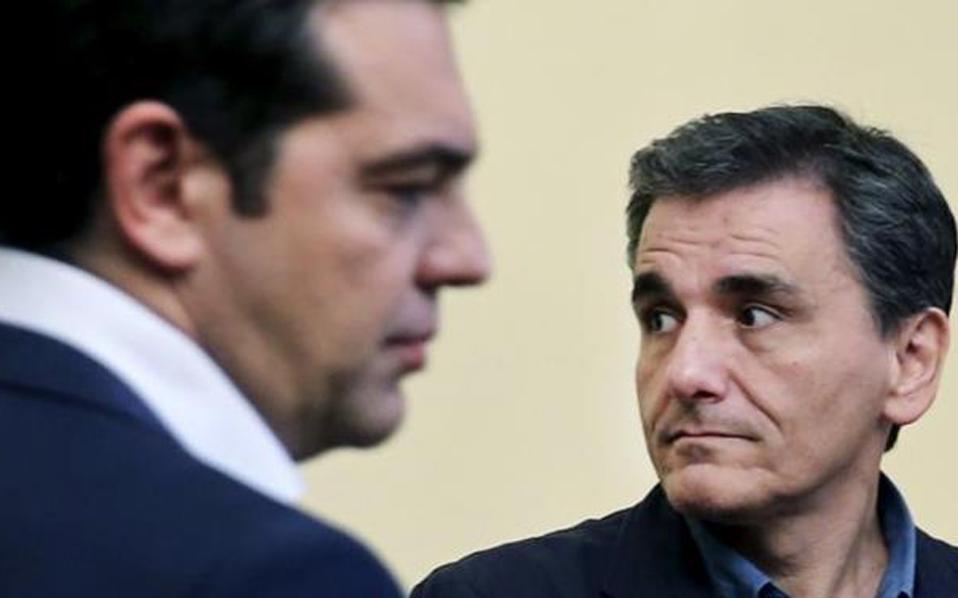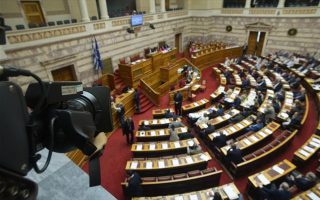Greece seeks 53.5 billion bailout in effort to keep euro

The government of Greek Prime Minister Alexis Tsipras sought a three-year bailout loan of at least 53.5 billion euros ($59.2 billion), in a last-ditch effort to keep the country in the euro.
In exchange, it offered a package of reforms and spending cuts, including pension savings and tax increases, similar to the one presented by creditors last month. The proposal was submitted late Thursday and will be presented to the Greek Parliament Friday. It is set to be discussed at a summit of European Union leaders Sunday to determine whether Greece will get a new bailout, or be forced to leave the single currency.
Although the odds of a so-called Grexit have climbed, “we continue to see Greece staying in the euro as marginally more likely, not least because the majority of Greeks prefer so,” Deutsche Bank analysts wrote in a note to clients. “Europe is intent on forcing an outcome either way.”
Market reaction suggested investors believe a deal can be done, or that the European Central Bank can successfully contain the fallout if one isn’t. The benchmark Stoxx Europe 600 Index rose 2.2 percent and Greek, Portuguese and Italian bonds rose. The euro rose 0.4 percent to $1.107.
Greece’s proposal for a three-year bailout loan was similar to the one presented by the European Commission on June 26. It includes creditors’ longstanding demands for sales tax increases and cuts in public spending on pensions. Greece also proposes the restructuring of its debt and a package of growth measures of 35 billion euros.
‘Realistic proposal’
Pressure has been mounting on Greece’s creditors to make the country’s debt more manageable, giving it a chance to rebound from a crisis that has erased a quarter of its economy.
“A realistic proposal from Greece will have to be matched by an equally realistic proposal on debt sustainability from the creditors,” European Union President Donald Tusk told reporters in Luxembourg Thursday. “Only then will we have a win-win situation.”
The US wants to see debt sustainability in Greece, John Kirby, a State Department spokesman, told reporters in Washington Thursday.
German Chancellor Angela Merkel and her government have come under growing pressure to back away from resistance to debt relief for Greece, a major obstacle to a deal on keeping the country in the single currency.
Whether Greece can expect a writedown of its outstanding debts, which exceed 170 percent of gross domestic product, remains a key point of contention.
Debt relief
The European Commission’s vice president for the euro, Valdis Dombrovskis, said member states are open to considering debt relief for Greece. Principal writedowns, though, would be difficult to get past conservative figures including German Finance Minister Wolfgang Schaeuble.
He said Thursday he’s less optimistic than the French about “re-profiling,” which is generally understood as giving debtors more time to pay off loans, as a solution for Greece. France, which — unlike Germany — has been a sympathetic ally to Greece, provided technical assistance in the pulling together of the new reform proposal.
“We think debt relief of some form will be on the table,” but structured in a fashion capable of winning German backing, Royal Bank of Scotland analyst Michael Michaelides said in a research report.
Party resistance
Even if Tsipras and creditors can reach a basic agreement, his greatest challenge may still lie at home. European leaders are likely to insist that reform measures be passed into binding legislation by the Greek parliament, where lawmakers from Tsipras’s ruling Coalition of the Radical Left, or Syriza, might vote against them.
A half-day meeting of Syriza lawmakers has been convened for Friday morning, in which the premier is expected to discuss the proposals to creditors.
The party was elected in January after it promised to fight the successive spending cuts and tax hikes that had been required for previous bailouts.
“Greece is obviously working to secure an immediate deal, but it must be a deal that opens a window out of the current crisis,” Energy Minister Panagiotis Lafazanis, a hard-line Syriza member, said at a conference in Athens Thursday. “We don’t want a third memorandum with tough austerity measures.”
[Bloomberg]





